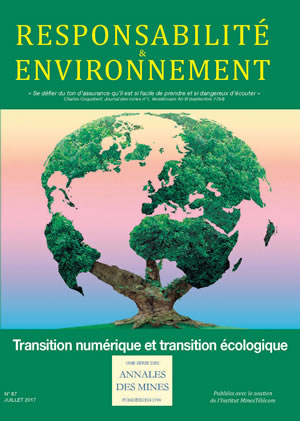|
 N° 87 - Juillet 2017 - Transition numérique et transition écologique N° 87 - Juillet 2017 - Transition numérique et transition écologique
Accelerating Energy & Environmental Transition in Europe through digital
By Julia REINAUD
Director I24C
Nicolas CLINCKX
Vice-President Energy & Utilities
and
Paul FARAGGI
Manager Energy & Utilities Capgemini Consulting (1)
Digitalization is becoming ubiquitous in the energy sector, enabling a more decentralized energy system and blurring the traditional energy sector boundaries, with more integration with buildings, mobility solutions and industry. Digitalization is accelerating the pace of the energy transition, mainly thanks to three levers: 1) enhancing customer interaction with the energy system, 2) optimizing operations, and 3) enabling new business models for traditional energy actors as well as opening up space for new entrants from other sectors and energy startups. Digital technologies are also facilitating a cost-effective, clean energy transition, mainly by increasing energy efficiency and flexibility, as well as enabling the integration of renewable electricity into smart(er) grids and developing low-carbon solutions.
This article gives a brief overview of the digitally-enabled innovations in Europe’s energy markets and how various players are positioning themselves to take advantage of these opportunities. It concludes by highlighting some of the policy issues this transformation raises and the challenges ahead for European businesses to reap the benefits.
 Télécharger gratuitement l'article Télécharger gratuitement l'article
 Retour au sommaire Retour au sommaire
 N° 87 - July 2017 - The digital and environmental transitions N° 87 - July 2017 - The digital and environmental transitions
Accelerating Energy & Environmental Transition in Europe through digital
Julia Reinaud,
Director I24C,
Nicolas Clinckx,
Vice-President Energy & Utilities,
and
Paul Faraggi,
Manager Energy & Utilities Capgemini Consulting
Digitalization is becoming ubiquitous in the energy sector, enabling a more decentralized energy system and blurring the traditional energy sector boundaries, with more integration with buildings, mobility solutions and industry. Digitalization is accelerating the pace of the energy transition, mainly thanks to three levers: 1) enhancing customer interaction with the energy system, 2) optimizing operations, and 3) enabling new business models for traditional energy actors as well as opening up space for new entrants from other sectors and energy startups. Digital technologies are also facilitating a cost-effective, clean energy transition, mainly by increasing energy efficiency and flexibility, as well as enabling the integration of renewable electricity into smart(er) grids and developing low-carbon solutions.
This article gives a brief overview of the digitally-enabled innovations in Europe’s energy markets and how various players are positioning themselves to take advantage of these opportunities. It concludes by highlighting some of the policy issues this transformation raises and the challenges ahead for European businesses to reap the benefits.
 Download full article Download full article
 Retour au sommaire Retour au sommaire
 N° 87 - Julio 2017 - Transición digital y transición ecológica N° 87 - Julio 2017 - Transición digital y transición ecológica
Accelerating Energy & Environmental Transition in Europe through digital
Julia Reinaud,
Director I24C,
Nicolas Clinckx,
Vice-President Energy & Utilities,
and
Paul Faraggi,
Manager Energy & Utilities Capgemini Consulting
Digitalization is becoming ubiquitous in the energy sector, enabling a more decentralized energy system and blurring the traditional energy sector boundaries, with more integration with buildings, mobility solutions and industry. Digitalization is accelerating the pace of the energy transition, mainly thanks to three levers: 1) enhancing customer interaction with the energy system, 2) optimizing operations, and 3) enabling new business models for traditional energy actors as well as opening up space for new entrants from other sectors and energy startups. Digital technologies are also facilitating a cost-effective, clean energy transition, mainly by increasing energy efficiency and flexibility, as well as enabling the integration of renewable electricity into smart(er) grids and developing low-carbon solutions.
This article gives a brief overview of the digitally-enabled innovations in Europe’s energy markets and how various players are positioning themselves to take advantage of these opportunities. It concludes by highlighting some of the policy issues this transformation raises and the challenges ahead for European businesses to reap the benefits.
 Retour au sommaire Retour au sommaire
|




